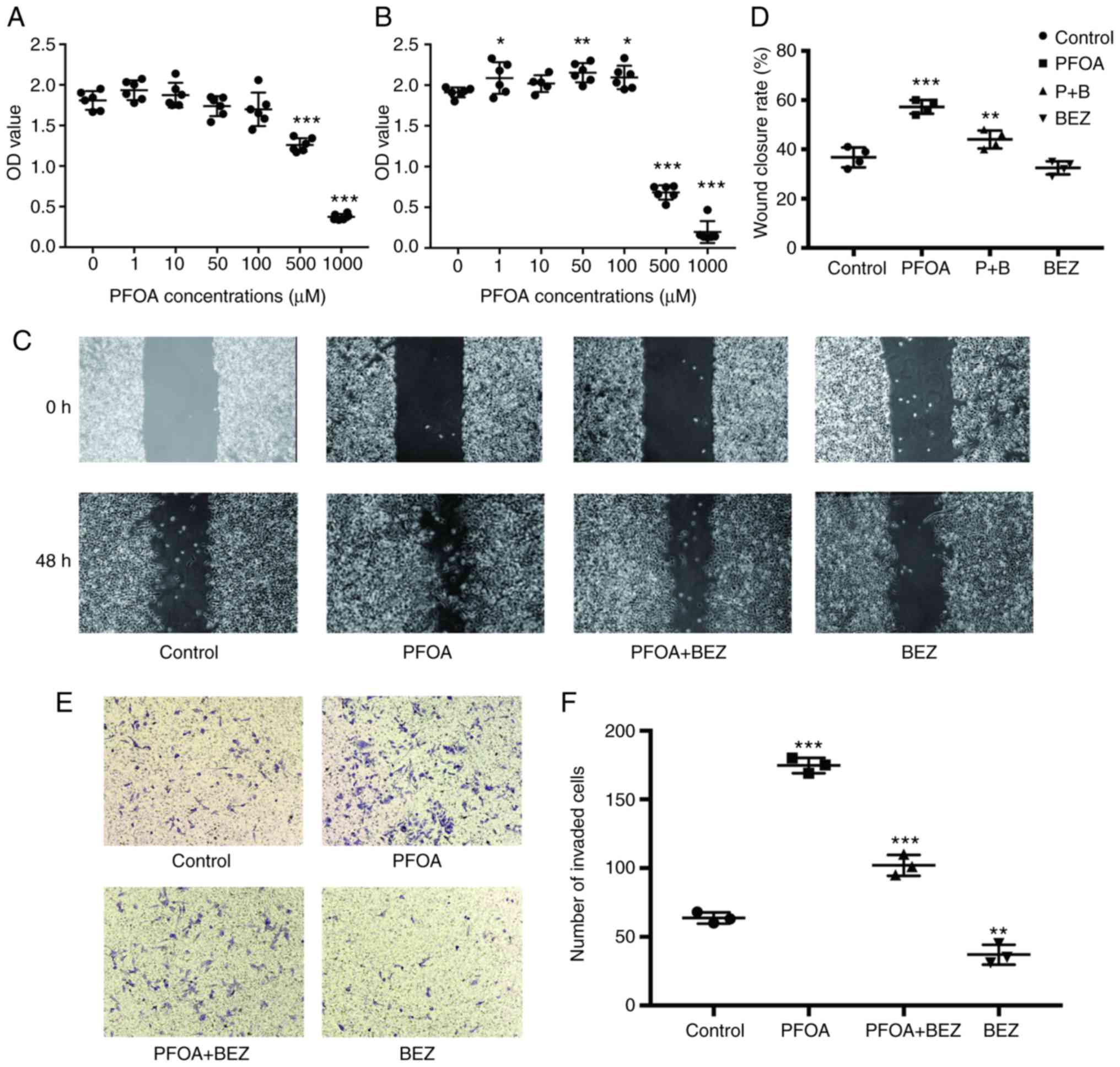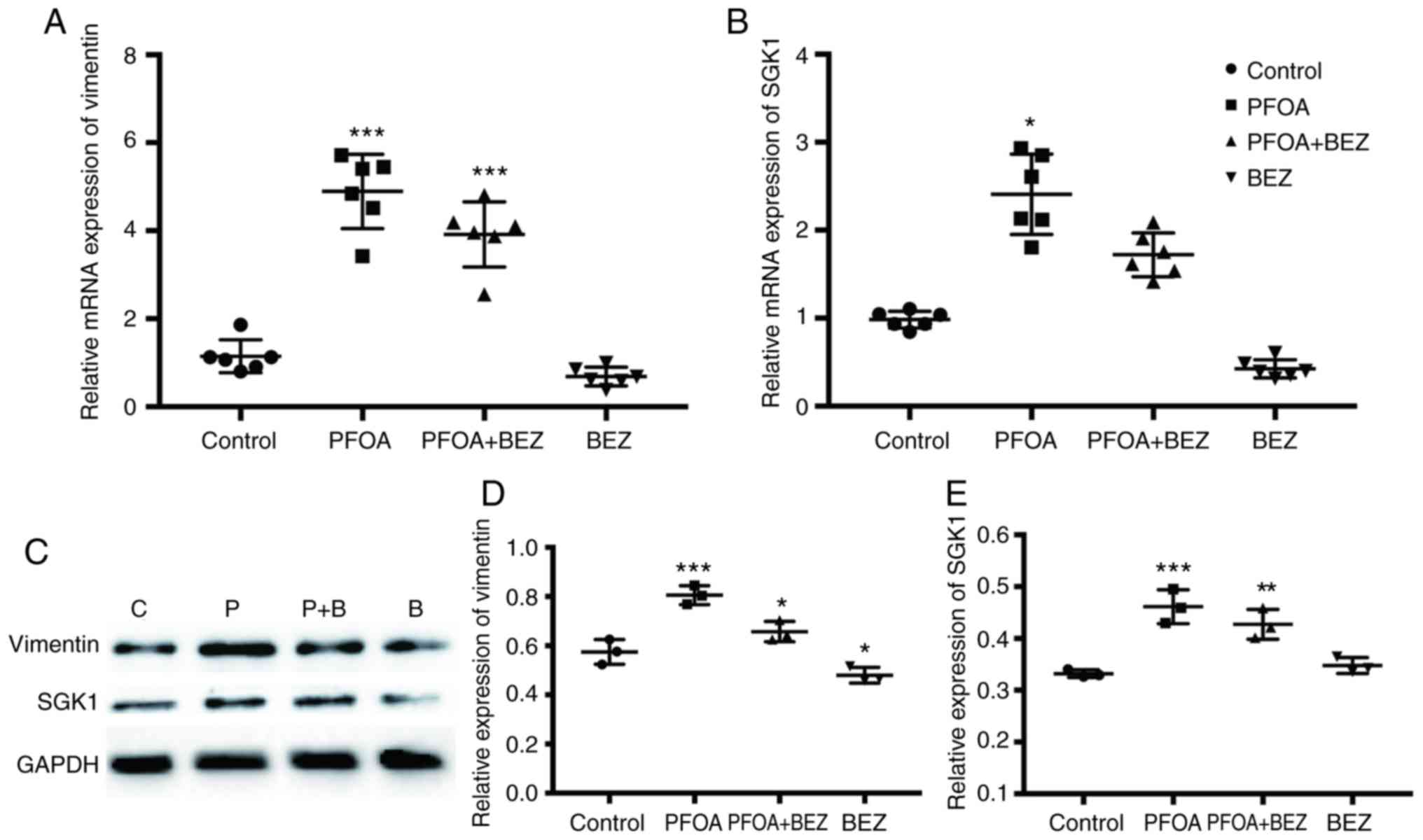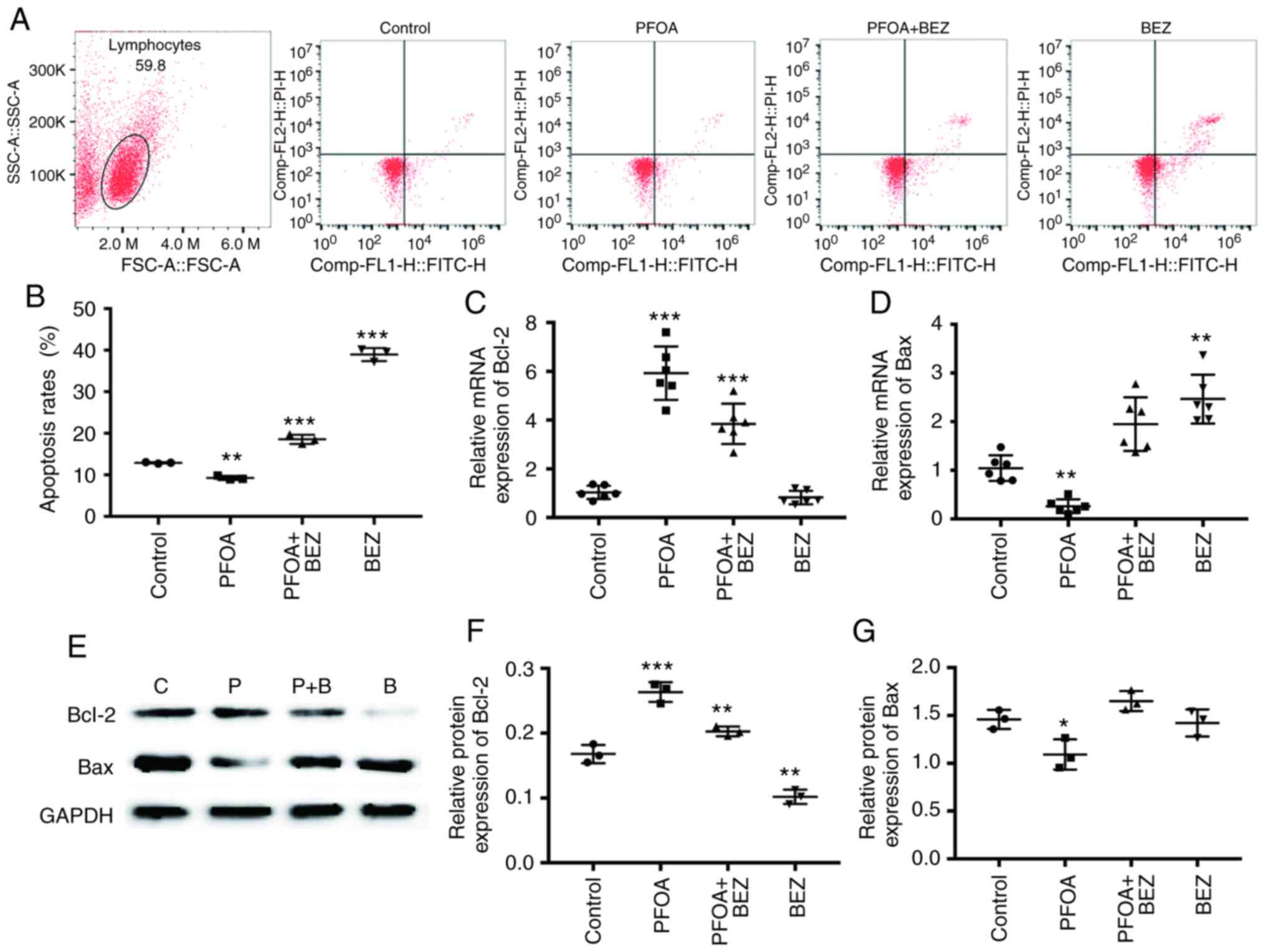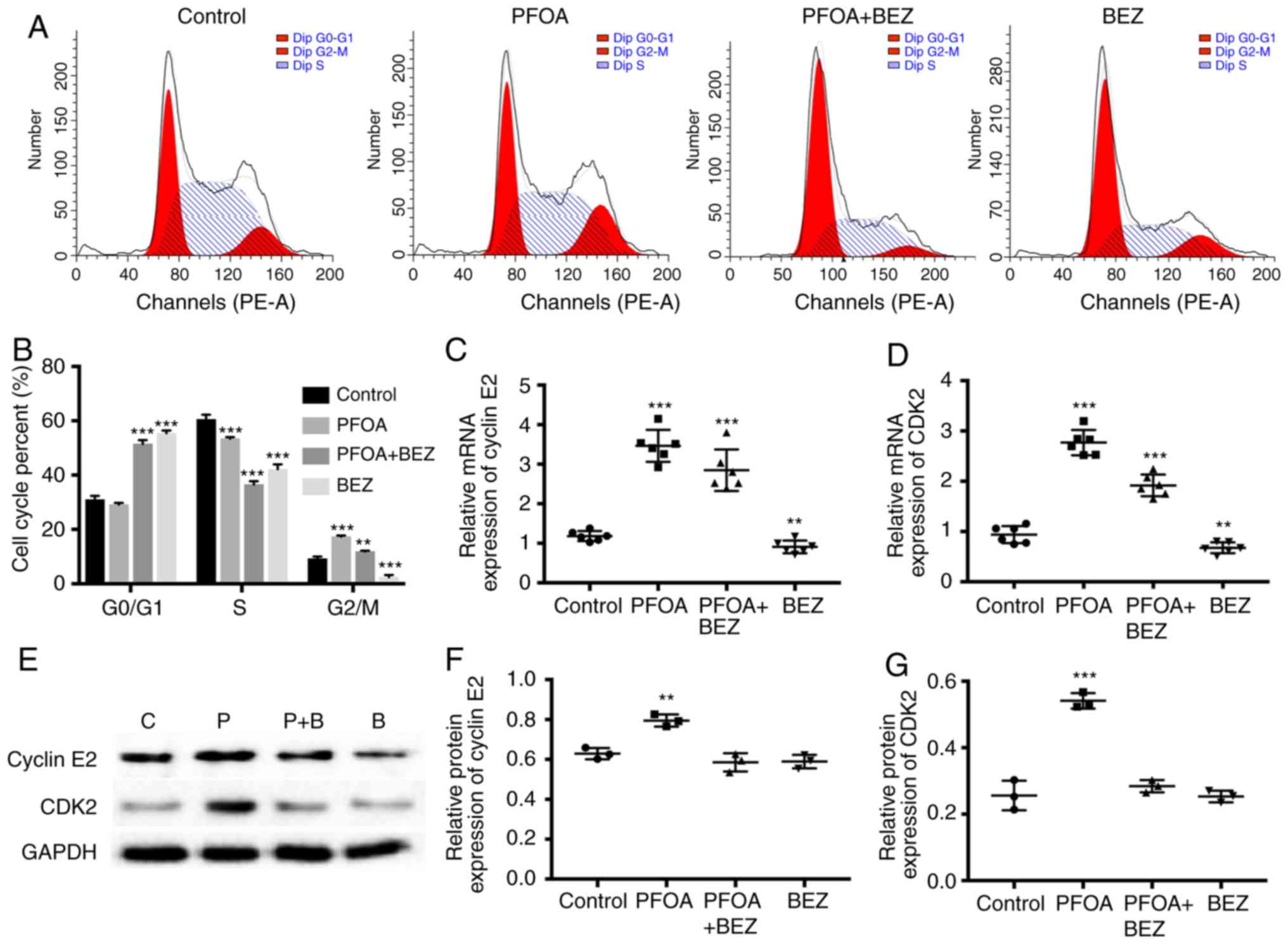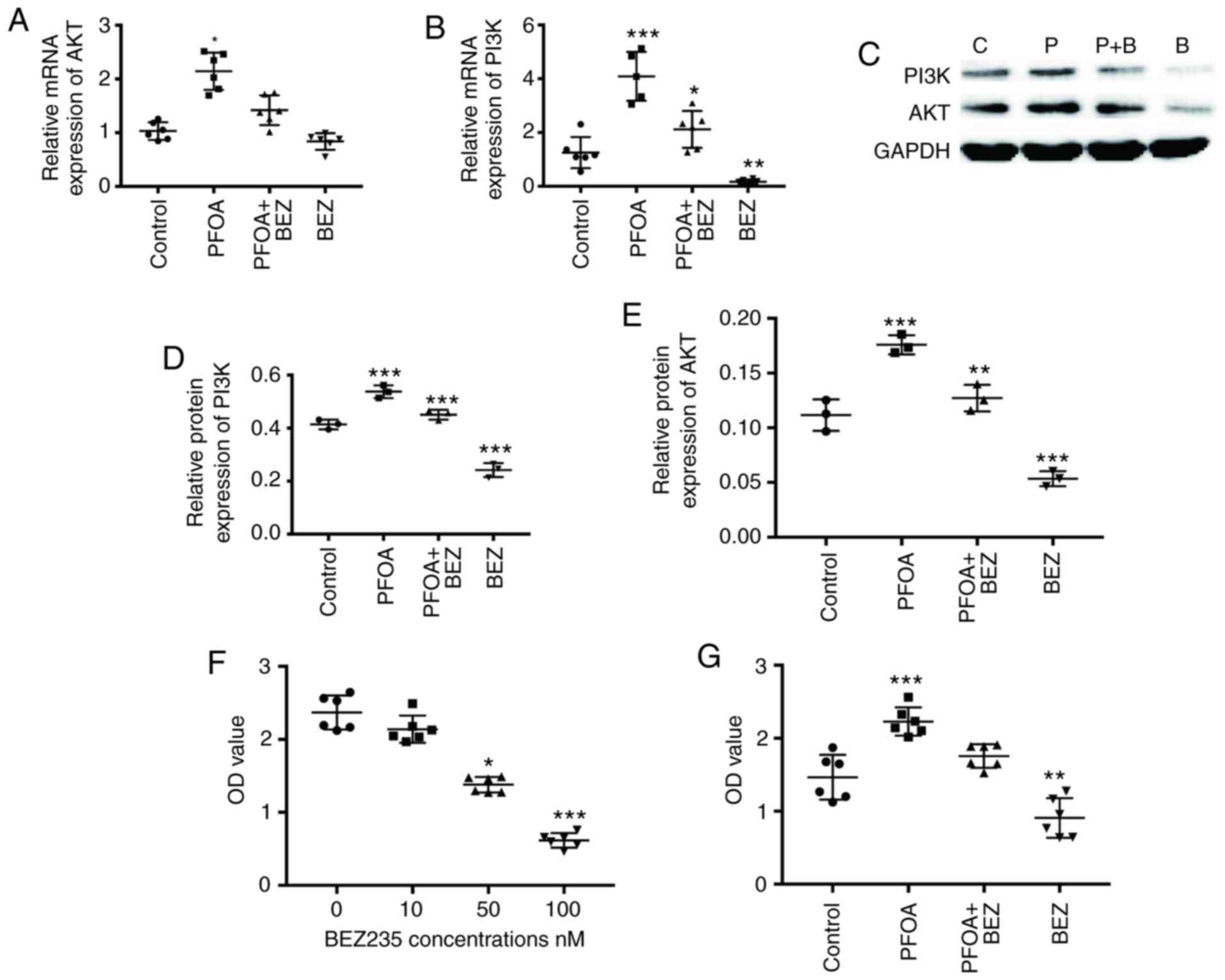|
1
|
Bartell SM, Calafat AM, Lyu C, Kato K,
Ryan PB and Steenland K: Rate of decline in serum PFOA
concentrations after granular activated carbon filtration at two
public water systems in Ohio and West Virginia. Environ Health
Perspect. 118:222–228. 2010. View Article : Google Scholar : PubMed/NCBI
|
|
2
|
Shin HM, Vieira VM, Ryan PB, Steenland K
and Bartell SM: Retrospective exposure estimation and predicted
versus observed serum perfluorooctanoic acid concentrations for
participants in the C8 health project. Environ Health Perspect.
119:1760–1765. 2011. View Article : Google Scholar : PubMed/NCBI
|
|
3
|
Barry V, Winquist A and Steenland K:
Perfluorooctanoic acid (PFOA) exposures and incident cancers among
adults living near a chemical plant. Environ Health Perspect.
121:1313–1318. 2013. View Article : Google Scholar : PubMed/NCBI
|
|
4
|
Lau C, Anitole K, Hodes C, Lai D,
Pfahles-Hutchens A and Seed J: Perfluoroalkyl acids: A review of
monitoring and toxicological findings. Toxicol Sci. 99:366–394.
2007. View Article : Google Scholar : PubMed/NCBI
|
|
5
|
Pierozan P, Jerneren F and Karlsson O:
Perfluorooctanoic acid (PFOA) exposure promotes proliferation,
migration and invasion potential in human breast epithelial cells.
Arch Toxicol. 92:1729–1739. 2018. View Article : Google Scholar : PubMed/NCBI
|
|
6
|
Wielsøe M, Kern P and Bonefeld-Jørgensen
EC: Serum levels of environmental pollutants is a risk factor for
breast cancer in Inuit: a case control study. Environ Health.
16:562017. View Article : Google Scholar : PubMed/NCBI
|
|
7
|
Cha YH, Yook JI, Kim HS and Kim NH:
Catabolic metabolism during cancer EMT. Arch Pharm Res. 38:313–320.
2015. View Article : Google Scholar : PubMed/NCBI
|
|
8
|
Natarajan J, Chandrashekar C and
Radhakrishnan R: Critical biomarkers of epithelial-mesenchymal
transition in the head and neck cancers. J Cancer Res Ther.
10:512–518. 2014.PubMed/NCBI
|
|
9
|
Myong NH: Loss of E-cadherin and
acquisition of vimentin in epithelial-mesenchymal transition are
noble indicators of uterine cervix cancer progression. Korean J
Pathol. 46:341–348. 2012. View Article : Google Scholar : PubMed/NCBI
|
|
10
|
Liu W, Wang X, Wang Y, Dai Y, Xie Y, Ping
Y, Yin B, Yu P, Liu Z, Duan X, et al: SGK1 inhibition-induced
autophagy impairs prostate cancer metastasis by reversing EMT. J
Exp Clin Cancer Res. 37:732018. View Article : Google Scholar : PubMed/NCBI
|
|
11
|
Jeanes A, Gottardi CJ and Yap AS:
Cadherins and cancer: How does cadherin dysfunction promote tumor
progression? Oncogene. 27:6920–6929. 2008. View Article : Google Scholar : PubMed/NCBI
|
|
12
|
Satelli A and Li S: Vimentin as a
potential molecular target in cancer therapy or Vimentin, an
overview and its potential as a molecular target for cancer
therapy. Cell Mol Life Sci. 68:3033–3046. 2011. View Article : Google Scholar : PubMed/NCBI
|
|
13
|
Ibrahim U, Saqib A, Mohammad F, Ding J,
Salman B, Collado FK and Dhar M: Embryonal rhabdomyosarcoma of the
cervix: A rare disease at an uncommon age. Cureus.
9:e18642017.PubMed/NCBI
|
|
14
|
Mummery CL, van den Brink CE and de Laat
SW: Commitment to differentiation induced by retinoic acid in P19
embryonal carcinoma cells is cell cycle dependent. Dev Biol.
121:10–19. 1987. View Article : Google Scholar : PubMed/NCBI
|
|
15
|
Filipczyk AA, Laslett AL, Mummery C and
Pera MF: Differentiation is coupled to changes in the cell cycle
regulatory apparatus of human embryonic stem cells. Stem Cell Res.
1:45–60. 2007. View Article : Google Scholar : PubMed/NCBI
|
|
16
|
Santamaria D and Ortega S: Cyclins and
CDKS in development and cancer: Lessons from genetically modified
mice. Front Biosci. 11:1164–1188. 2006. View Article : Google Scholar : PubMed/NCBI
|
|
17
|
Stead E, White J, Faast R, Conn S,
Goldstone S, Rathjen J, Dhingra U, Rathjen P, Walker D and Dalton
S: Pluripotent cell division cycles are driven by ectopic Cdk2,
cyclin A/E and E2F activities. Oncogene. 21:8320–8333. 2002.
View Article : Google Scholar : PubMed/NCBI
|
|
18
|
Courtney KD, Corcoran RB and Engelman JA:
The PI3K pathway as drug target in human cancer. J Clin Oncol.
28:1075–1083. 2010. View Article : Google Scholar : PubMed/NCBI
|
|
19
|
Fruman DA and Rommel C: PI3K and cancer:
Lessons, challenges and opportunities. Nat Rev Drug Discov.
13:140–156. 2014. View
Article : Google Scholar : PubMed/NCBI
|
|
20
|
Meng X, Dong X, Wang W, Yang L, Zhang X,
Li Y, Chen T, Ma H, Qi D and Su J: Natural borneol enhances
paclitaxel-induced apoptosis of ESCC cells by inactivation of the
PI3K/AKT. J Food Sci. 83:1436–1443. 2018. View Article : Google Scholar : PubMed/NCBI
|
|
21
|
Livak KJ and Schmittgen TD: Analysis of
relative gene expression data using real-time quantitative PCR and
the 2(-Delta Delta C(T)) method. Methods. 25:402–408. 2001.
View Article : Google Scholar : PubMed/NCBI
|
|
22
|
Yan S, Wang J, Zhang W and Dai J:
Circulating microRNA profiles altered in mice after 28 d exposure
to perfluorooctanoic acid. Toxicol Lett. 224:24–31. 2014.
View Article : Google Scholar : PubMed/NCBI
|
|
23
|
Yang F, Qian XJ, Qin W, Deng R, Wu XQ, Qin
J, Feng GK and Zhu XF: Dual phosphoinositide 3-kinase/mammalian
target of rapamycin inhibitor NVP-BEZ235 has a therapeutic
potential and sensitizes cisplatin in nasopharyngeal carcinoma.
PLoS One. 8:e598792013. View Article : Google Scholar : PubMed/NCBI
|
|
24
|
Ma Z, Liu X, Li F, Wang Y, Xu Y, Zhang M
and Zhang X, Ying X and Zhang X: Perfluorooctanoic acid induces
human Ishikawa endometrial cancer cell migration and invasion
through activation of ERK/mTOR signaling. Oncotarget.
7:66558–66568. 2016. View Article : Google Scholar : PubMed/NCBI
|
|
25
|
Blum JM, Añó L, Li Z, Van Mater D, Bennett
BD, Sachdeva M, Lagutina I, Zhang M, Mito JK, Dodd LG, et al:
Distinct and overlapping sarcoma subtypes initiated from muscle
stem and progenitor cells. Cell Rep. 5:933–940. 2013. View Article : Google Scholar : PubMed/NCBI
|
|
26
|
Pierozan P and Karlsson O: PFOS induces
proliferation, cell-cycle progression, and malignant phenotype in
human breast epithelial cells. Arch Toxicol. 92:705–716. 2018.
View Article : Google Scholar : PubMed/NCBI
|
|
27
|
Tsuda S: Differential toxicity between
perfluorooctane sulfonate (PFOS) and perfluorooctanoic acid (PFOA).
J Toxicol Sci 41 (Special). SP27–SP36. 2016. View Article : Google Scholar
|
|
28
|
Hwang HC and Clurman BE: Cyclin E in
normal and neoplastic cell cycles. Oncogene. 24:2776–2786. 2005.
View Article : Google Scholar : PubMed/NCBI
|
|
29
|
Marampon F, Ciccarelli C and Zani BM:
Down-regulation of c-Myc following MEK/ERK inhibition halts the
expression of malignant phenotype in rhabdomyosarcoma and in non
muscle-derived human tumors. Mol Cancer. 5:312006. View Article : Google Scholar : PubMed/NCBI
|
|
30
|
Le Page C, Huntsman DG, Provencher DM and
Mes-Masson AM: Predictive and prognostic protein biomarkers in
epithelial ovarian cancer: Recommendation for future studies.
Cancers (Basel). 2:913–954. 2010. View Article : Google Scholar : PubMed/NCBI
|
|
31
|
Bali A, O'Brien PM, Edwards LS, Sutherland
RL, Hacker NF and Henshall SM: Cyclin D1, p53, and p21Waf1/Cip1
expression is predictive of poor clinical outcome in serous
epithelial ovarian cancer. Clin Cancer Res. 10:5168–5177. 2004.
View Article : Google Scholar : PubMed/NCBI
|
|
32
|
Milde-Langosch K and Riethdorf S: Role of
cell-cycle regulatory proteins in gynecological cancer. J Cell
Physiol. 196:224–244. 2003. View Article : Google Scholar : PubMed/NCBI
|
|
33
|
He G, Kuang J, Huang Z, Koomen J,
Kobayashi R, Khokhar AR and Siddik ZH: Upregulation of p27 and its
inhibition of CDK2/cyclin E activity following DNA damage by a
novel platinum agent are dependent on the expression of p21. Br J
Cancer. 95:1514–1524. 2006. View Article : Google Scholar : PubMed/NCBI
|
|
34
|
Qin Y, Guo H, Tang B and Yang SM: The
non-reverse transcriptase activity of the human telomerase reverse
transcriptase promotes tumor progression (review). Int J Oncol.
45:525–531. 2014. View Article : Google Scholar : PubMed/NCBI
|
|
35
|
Satelli A and Li S: Vimentin in cancer and
its potential as a molecular target for cancer therapy. Cell Mol
Life Sci. 68:3033–3046. 2011. View Article : Google Scholar : PubMed/NCBI
|
|
36
|
Yao Y, Jiang Q, Jiang L, Wu J, Zhang Q,
Wang J, Feng H and Zang P: Lnc-SGK1 induced by Helicobacter pylori
infection and highsalt diet promote Th2 and Th17 differentiation in
human gastric cancer by SGK1/Jun B signaling. Oncotarget.
7:20549–20560. 2016. View Article : Google Scholar : PubMed/NCBI
|
|
37
|
Szmulewitz RZ, Chung E, Al-Ahmadie H,
Daniel S, Kocherginsky M, Razmaria A, Zagaja GP, Brendler CB,
Stadler WM and Conzen SD: Serum/glucocorticoid-regulated kinase 1
expression in primary human prostate cancers. Prostate. 72:157–164.
2012. View Article : Google Scholar : PubMed/NCBI
|
|
38
|
Jo A, Yun HJ, Kim JY, Lim SC, Choi HJ,
Kang BS, Choi BY and Choi HS: Prolyl isomerase PIN1 negatively
regulates SGK1 stability to mediate tamoxifen resistance in breast
cancer cells. Anticancer Res. 35:785–794. 2015.PubMed/NCBI
|
|
39
|
Gulhati P, Bowen KA, Liu J, Stevens PD,
Rychahou PG, Chen M, Lee EY, Weiss HL, O'Connor KL, Gao T and Evers
BM: mTORC1 and mTORC2 regulate EMT, motility, and metastasis of
colorectal cancer via RhoA and Rac1 signaling pathways. Cancer Res.
71:3246–3256. 2011. View Article : Google Scholar : PubMed/NCBI
|
|
40
|
Hassan M, Watari H, AbuAlmaaty A, Ohba Y
and Sakuragi N: Apoptosis and molecular targeting therapy in
cancer. Biomed Res Int. 2014:1508452014. View Article : Google Scholar : PubMed/NCBI
|
|
41
|
Amundson SA, Myers TG, Scudiero D, Kitada
S, Reed JC and Fornace AJ Jr: An informatics approach identifying
markers of chemosensitivity in human cancer cell lines. Cancer Res.
60:6101–6110. 2000.PubMed/NCBI
|
|
42
|
Mihara M, Erster S, Zaika A, Petrenko O,
Chittenden T, Pancoska P and Moll UM: p53 has a direct apoptogenic
role at the mitochondria. Mol Cell. 11:577–590. 2003. View Article : Google Scholar : PubMed/NCBI
|
|
43
|
Franke TF, Hornik CP, Segev L, Shostak GA
and Sugimoto C: PI3K/Akt and apoptosis: Size matters. Oncogene.
22:8983–8998. 2003. View Article : Google Scholar : PubMed/NCBI
|
|
44
|
Cantley LC and Neel BG: New insights into
tumor suppression: PTEN suppresses tumor formation by restraining
the phosphoinositide 3-kinase/AKT pathway. Proc Natl Acad Sci USA.
96:4240–4245. 1999. View Article : Google Scholar : PubMed/NCBI
|
|
45
|
Blanco-Aparicio C, Renner O, Leal JF and
Carnero A: PTEN, more than the AKT pathway. Carcinogenesis.
28:1379–1386. 2007. View Article : Google Scholar : PubMed/NCBI
|















